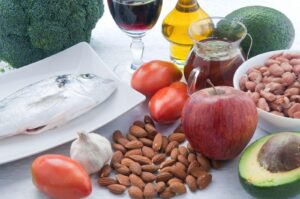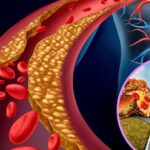
The liver controls the amount of cholesterol in the bloodstream. Dietary cholesterol is absorbed from the small intestine after a meal, digested, and deposited in the liver. The liver could produce cholesterol because the body needs it.
When the body has far more cholesterol, this could form plaque all along the interior walls of arteries, narrowing them. The threat to your health rises as the level of cholesterol in your bloodstream rises. High cholesterol increases the risk of cardiovascular disorders like heart attack and stroke. This is why it’s crucial to get your cholesterol checked so you know what your levels are.
Modifying your diet can help you reduce your cholesterol and facilitate the flow of lipids in your blood system. The ideal method for obtaining a low cholesterol diet is to include foods that decrease the dangerous cholesterol-carrying particles that lead to artery-clogging atherosclerosis. Here we have enlisted the foods which you can add to your diet to lower cholesterol levels.

13 Foods that will lower cholesterol levels:
Table of Contents
Oats
Breakfast with a bowl of oats or chilled oat-based porridge-like Cereals is a simple introductory step in lowering cholesterol. It contains 1–2 grams of soluble fiber. For an extra half-gram, add bananas or perhaps some strawberries. Current dietary recommendations call for 20 to 35 grams of fiber per day, with at least 5 to 10 grams of soluble fiber.
Garlic
Garlic has been used as a cooking component and a medicinal for millennia. It contains several potent plant components, notably allicin, which is the principal active ingredient. Garlic has been shown in studies to lower blood pressure in persons with high blood pressure and to reduce total and “bad” LDL cholesterol, albeit the latter impact is less potent.
Soybeans
Soybeans and meals produced from them, such as tofu and soy milk, were long advertised as an effect cholesterol-lowering food. Analyses reveal that the effect is much smaller. LDL cholesterol can be reduced by eating 25 grams of soy protein per day, which is equivalent to 10 ounces of tofu or 2 1/2 cups of soy milk.
Fatty Fish
Fish could help lower LDL in 2 ways: by substituting meat, which contains LDL-boosting saturated fats, and by providing LDL-lowering omega-3 fats. Omega-3 fatty acids lower triglycerides in the circulation and reduce the risk of stroke by preventing irregular cardiac rhythms.
Avocados
Avocados are high in vitamins, minerals, and monounsaturated fatty acids. According to research, including avocado in a heart-healthy diet once a day can assist those who are significantly overweight lower their LDL cholesterol levels. Avocados are most commonly associated with guacamole, which is typically served with high-fat corn chips. Avocado slices can be added to salads and sandwiches, or eaten as a side dish. Guacamole can also be made using raw sliced vegetables like cucumber slices. Saturated fats, including those found in meats, are replaced with MUFAs in the Mediterranean diet, making it heart-healthy.
Fiber
Fiber has been related to good cholesterol in the body, and multiple studies have shown that increasing soluble fiber consumption lowers bad cholesterol levels in the body. As a result, more fibrous meals such as oatmeal, complete fruits like apple and pear, and high-fiber legumes must be consumed. Seeds such as chia seeds must be included in your diet to help you get more fiber.
Almonds
Almonds have the most fiber of any nut, but other popular types like pistachios and pecans are close Walnuts also offer the benefit of being a strong supply of plant-based polyunsaturated omega-3 fatty acids.
Barley
Barley is a whole grain that contains a lot of beta-glucans. Beta-glucans are a form of soluble fiber that interacts with fats and bile salts in the gastrointestinal tract to help decrease cholesterol levels.
Barley beta-glucan decreases LDL cholesterol and other non-HDL cholesterol, according to a meta-analysis of randomized controlled trials. As a result, incorporating barley-based foods into your diet could help lower your risk of heart disease.
Dark Chocolate
Although it may seem paradoxical, including dark chocolate and cocoa in your diet may be beneficial to your heart. The flavonoids found in dark chocolate and cocoa have been demonstrated in studies to reduce the risk of heart disease.
One research trial, in particular, looked at 84 persons who ate two gm of dark chocolate or two grams of milk chocolate every day for six months. Total cholesterol, triglycerides, and LDL cholesterol all fell dramatically after six months in those who ate 70% dark chocolate compared to those who consumed milk chocolate, and blood pressure improved immensely.
Olive Oil
Olive oil, a cornerstone of the Mediterranean diet, has been extensively researched for its heart-healthy advantages. Extra virgin olive oil is high in monounsaturated fats, which aid in the reduction of LDL cholesterol. It’s also high in polyphenols, which can aid to lower inflammation and cardiovascular risk. Saturated fats can be replaced with extra virgin olive oil in your diet to help protect your heart.
Vegetables
Vegetables are helpful to your health for a variety of reasons, including heart health. Veggies, like fruits, are nutrient-dense, containing numerous vitamins, minerals, fiber, and antioxidants. Additionally, they are low in calories and fat, making them a heart-healthy choice.
Dietary fiber from whole foods, such as vegetables, may lower total and LDL cholesterol levels, lowering the risk of heart disease.
Foods that have been supplemented with sterols and stanols.
Plant-derived sterols and stanols hinder the body’s capacity to absorb cholesterol from the diet. They’ve been found in everything from margarine to granola bars to orange juice and chocolate. They can also be purchased as supplements. LDL cholesterol can be reduced by taking 2 grams of plant sterols or stanols each day.
Tea
Polyphenols in tea have antioxidative, anti-inflammatory, and cholesterol-lowering effects. These substances may help to avoid heart attacks and strokes. Though some studies are contradictory, the preponderance of evidence suggests that both green and black tea possess heart-health benefits.






